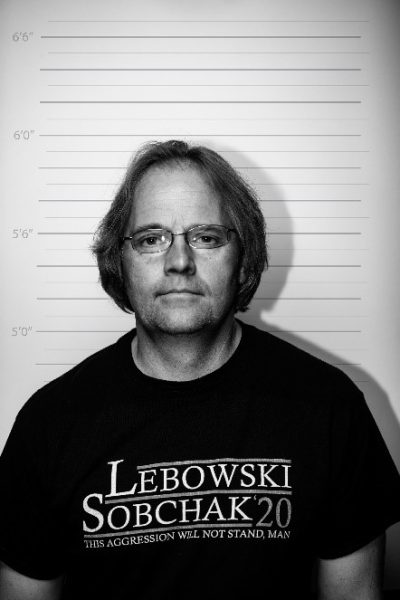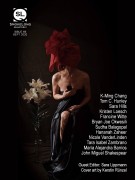To be honest, I’m always a sucker for meta-narratives. In building a meta-narrative, writers get to explore the practice and theory behind post-modernism while at the same time having the most fun. In “Questions for Further Study,” the narrative takes the shape of a study guide in response to a poetry collection, most likely written by the same author of the questionnaire. Before pursuing this frame, did you write poems in the character’s voice, or pull up some of your poems, or are the poems a completely imaginary jumping-off point for this story?
“Questions for Further Study” is actually a coda for my unpublished poetry manuscript, Love As The World Ends. A lot of the imagery in the story (the reference to turning fifty in section two, the light in the puddle and the soap bubble, etc., in section three, the references to autism and adoption) alludes to poems in the manuscript. What’s most fictional here is the notion that book clubs ever read and discuss poetry collections. I wish they would. Having seen questions for further study and for book clubs in the backs of various memoirs, novels, and short story collections, I sort of concocted this fantasy that a poetry collection would receive the same kind of treatment.
Contemporary flash fiction writers such as K.B. Carle seem to work primarily in “hermit crab” form, where fiction adopts and overrides the frames of written communication not normally used for story-telling. “Questions for Further Study” engages form in a similar manner—do most of your stories experiment with form in this way, or are they more conventional? Does your instinct or the story itself dictate the form it will take?
I prefer the term “appropriations” because the idea is to appropriate non-literary forms and turn them into literary forms. I have a prose poem in the form of a chili recipe. To give a sense of the flavor (ha-ha), here’s the beginning of the first section, entitled “Whatcha Need”:
the river
3 pounds ground beef
the passing of the dead on the banks of what remains
4 Tbsp minced garlic
a galloping sound
2 diced green peppers
And here’s the beginning of the second section, entitled “Whatcha Do”:
Begin with the river. Brown beef and memories of the dead with garlic, green peppers, the heartsong of the near-shattered violinist, and onion. Love the world the way a horse’s spirit gallops in its body.
I don’t write this way too often, but I’m fascinated by this kind of writing. Once you start thinking along these lines, you see opportunities for new forms of writing everywhere you look. If you’re interested in hermit crab essays or appropriations, I highly recommend The Shell Game: Writers Play with Borrowed Forms, an anthology edited by Kim Adrian. My personal faves in there are by Joey Franklin, Kathryn A. Kopple, Dinty Moore, Brenda Miller, and Michael Martone.
I’m also a big sucker for playful and precise syntax. In this story, run-on sentences and a lack of commas for pauses create an avalanche effect where the reader’s only reprieve from the forward momentum is the numbered breaks between items. How does this effect pair with the thematic and narrative dynamics of the story?
That’s a great question, the kind that’s forcing me to think about my own writing in new ways. I would have to say that the story explores several subjects that I find overwhelming: aging, fatherhood, self-doubt, heartbreak. As you can see from my answer, the decision to run with run-ons in the story was more intuitive than programmed. I wrote about these things the way I feel about these things, and the punctuation or lack thereof was part of that, I think.
The narrator seems distressed about the demands of fatherhood, and in items 7 and 8, the story alludes to challenges inherent to caring for adopted children and children with autism. What insights might you hope to offer about fatherhood and the fear of failure?
A father who sticks around is almost always going to better than one who doesn’t. All of the absentee fathers out there have really lowered the bar.
What are your current writing and artistic projects?
The full-length poetry collection, Love As The World Ends, is an ongoing labor of love. My chapbook, Adjusting to the Lights, consisting entirely of poems about raising an autistic son and adopting a teenage daughter from state foster care, won the Rattle Chapbook Prize and will go out to all of Rattle’s subscribers in December. What Feels Like Love: New and Selected Poems will be published by C&R Press in March 2021.



 The core workshop of SmokeLong Fitness is all in writing, so you can take part from anywhere at anytime. We are excited about creating a supportive, consistent and structured environment for flash writers to work on their craft in a community. We are thrilled and proud to say that our workshop participants have won, placed, or been listed in every major flash competition. Community works.
The core workshop of SmokeLong Fitness is all in writing, so you can take part from anywhere at anytime. We are excited about creating a supportive, consistent and structured environment for flash writers to work on their craft in a community. We are thrilled and proud to say that our workshop participants have won, placed, or been listed in every major flash competition. Community works.